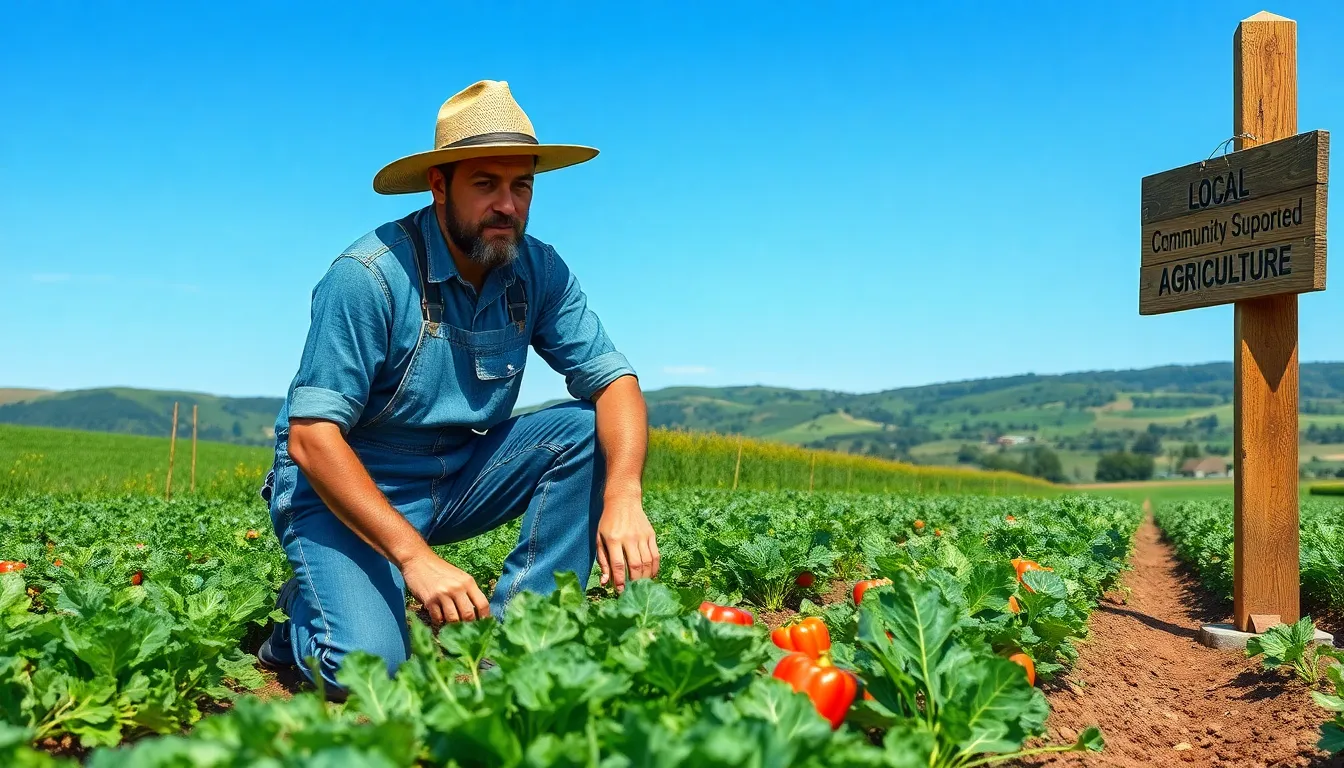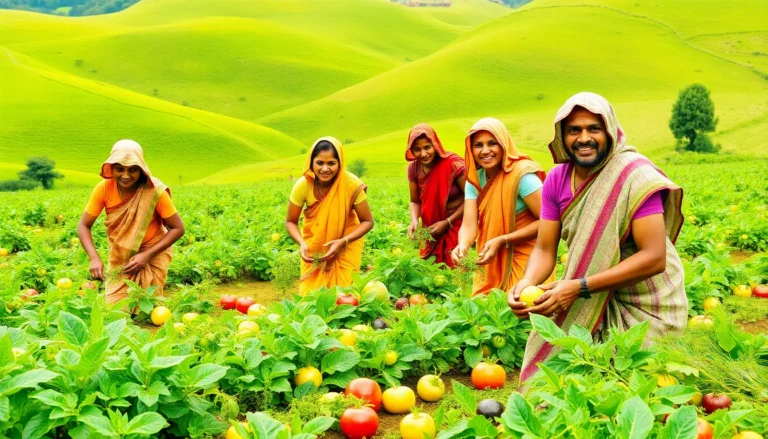
Organic Farming AP Human Geography Definition: Unveiling Its Impact on Society and Environment
In a world where kale smoothies reign supreme and avocados have become a currency, organic farming stands out as a beacon of hope for sustainable agriculture. But what exactly does it mean in the realm of AP Human Geography? It’s not just about growing veggies without pesticides; it’s a complex dance of culture, economy, and environmental stewardship.
Picture this: farmers swapping chemical-laden fertilizers for compost and community-supported agriculture models blooming like wildflowers. Understanding organic farming isn’t just for aspiring green thumbs; it’s crucial for grasping how societies interact with their environment. Dive into this exploration of organic farming’s definition and discover how it shapes our landscapes, economies, and even our dinner plates. Who knew geography could be so deliciously intriguing?
Organic Farming AP Human Geography Definition
Organic farming plays a crucial role in sustainable agriculture within the AP Human Geography framework. This approach emphasizes ecological balance, enriching soil health while promoting biodiversity.
Definition of Organic Farming
Organic farming refers to agricultural practices that exclude synthetic chemicals, genetically modified organisms, and artificial fertilizers. This method emphasizes the use of natural processes and materials to cultivate crops. Crop rotation, cover cropping, and compost application exemplify techniques utilized in organic farming. Certification standards, established by organizations such as the USDA, ensure farmers adhere to specific organic practices, enabling consumers to make informed choices regarding food sources.
Principles of Organic Farming
Principles of organic farming include a commitment to sustainability, biodiversity, and ecological balance. Crop diversity enhances soil fertility and pest resistance, promoting overall farm resilience. Soil health plays a key role in organic practices, focusing on maintaining and rebuilding soil ecosystems. Farmers prioritize avoiding chemicals, fostering natural pest control methods, and employing composting techniques. Additionally, social justice reflects in the equitable treatment of farmworkers and the promotion of local food systems.
AP Human Geography Context

Organic farming has a significant impact on AP Human Geography, particularly concerning agricultural practices and their implications on society. Understanding agriculture shapes the way people interact with their environments and resources.
Importance of Agriculture in Human Geography
Agriculture serves as a cornerstone of civilization, driving economic development and population growth. It influences settlement patterns, land use, and regional economies. Various agricultural practices determine how communities evolve, making food production a focal point of human geography. Examining these practices reveals insights into cultural values and environmental stewardship. For instance, the transition from subsistence farming to commercial agriculture has transformed rural landscapes. Additionally, examining agricultural changes highlights socioeconomic disparities, as access to resources varies among different regions.
Role of Organic Farming in AP Human Geography
Organic farming represents a response to modern agricultural challenges, aligning with sustainability principles. By promoting biodiversity, it supports ecological balance within various environments. Techniques utilized in organic farming, such as crop rotation and composting, enhance soil health while diversifying food sources. Community-supported agriculture fosters connections between consumers and local farmers, reshaping food systems and enhancing social equity. This organic movement also mirrors global trends toward health consciousness and environmental advocacy, showcasing the interconnectedness of cultural shifts and agricultural practices. Overall, organic farming plays a vital role in defining the landscape of agricultural geography and influencing societal values.
Benefits of Organic Farming
Organic farming offers numerous advantages that extend to environmental and economic aspects.
Environmental Benefits
Organic farming enhances soil health, promoting biodiversity and ecological balance. It uses techniques like crop rotation and composting, which boost soil fertility. Natural pest control methods reduce the need for synthetic pesticides, lessening environmental toxicity. Carbon sequestration improves air quality, combating climate change. Enhanced water management practices prevent runoff, protecting local waterways. Farmers implement cover crops that reduce soil erosion and maintain topsoil integrity. These environmentally friendly approaches contribute to sustainable farming practices, creating a healthier ecosystem for future generations.
Economic Benefits
Organic farming supports local economies by creating jobs in agricultural sectors. Consumers increasingly favor organic products, driving demand in markets. This growing preference often translates into premium prices for organic produce, benefiting farmers financially. Community-supported agriculture models foster direct relationships between producers and consumers, enhancing profitability. Farmers can also reduce input costs by using organic methods that rely on natural resources. Access to niche markets enables growth opportunities in various regions. Overall, organic farming not only nurtures the environment but also bolsters economic resilience in local communities.
Challenges in Organic Farming
Organic farming faces several significant challenges that can hinder its growth and effectiveness.
Certification and Regulation Issues
Certification requirements for organic farming can be complex and daunting. Farmers often navigate a maze of regulations that vary by region. Certification bodies demand comprehensive documentation that can be burdensome for small-scale producers. This rigorous process may discourage potential organic farmers from pursuing certification, impacting the overall organic market. Costs associated with obtaining and maintaining certification can also strain farmers’ budgets. Repeated inspections might create additional pressure, further complicating the journey toward achieving certified organic status. Ultimately, these hurdles create barriers that reduce participation in organic farming initiatives.
Market Accessibility
Limited market accessibility poses another challenge for organic farmers. Many farmers struggle to find reliable markets for their products due to limited local demand. Distribution channels can be fragmented, leading to difficulties in reaching consumers. Competition from conventionally grown products often results in price undercutting, which can deter consumers from purchasing organic options. Additionally, grocery stores and retailers may prioritize conventional goods to ensure consistent supply, making it hard for organic farmers to secure shelf space. Those factors collectively contribute to a challenging environment for organic market growth.
Conclusion
Organic farming represents a vital intersection of agriculture and human geography. Its practices not only promote environmental sustainability but also foster community connections and social equity. As more farmers adopt organic methods, they contribute to a shift in cultural values around food production and consumption.
The challenges facing organic farming, such as certification hurdles and market access, underscore the need for continued support and innovation within this sector. By understanding the broader implications of organic farming, individuals can appreciate its role in shaping healthier ecosystems and more resilient local economies. The ongoing evolution of organic practices highlights the importance of agriculture in addressing contemporary issues and enhancing societal well-being.



